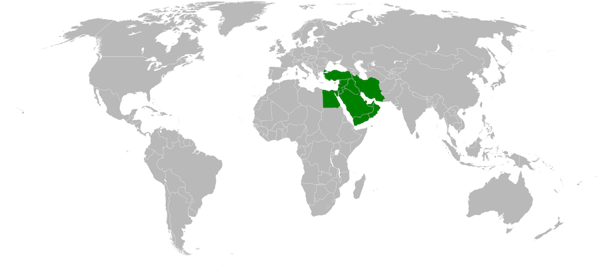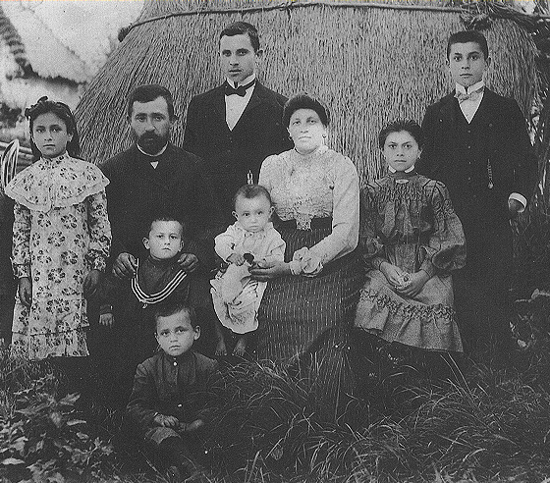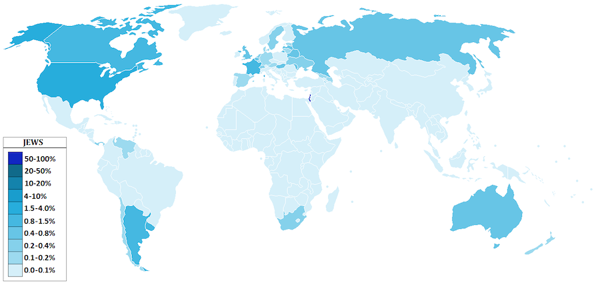
If I have Jewish ancestry, were my ancestors from Israel?
July 9, 2018

- Related Topics:
- Ancestry tests,
- Ancestry,
- Consumer genetic testing
A curious adult from California asks:
"If I have 9% DNA jewish and mideastern does that mean my ancestry is likely to be from Israel?"
Hi! Interpreting ancestry tests can be a bit tricky. The short answer to your question is that it’s possible your ancestry is from Israel, but it’s not guaranteed…there are other possibilities.
We’ll break this down into two parts:
- The information we’re getting from an ancestry test and how accurate we can expect it to be
- What it means to be of Jewish ancestry
Ancestry tests have limitations, which may lead to inaccurate results
Whenever we do an ancestry test, it’s good to keep in mind that there are limitations: the tests aren’t always 100% correct. This is especially true for populations that haven’t been studied very well, or for which there isn’t much genetic data.
“Asian” and “Middle Eastern” populations haven’t been well studied. In these cases, ancestry tests tend to make broad population assignments (e.g. “Asia” instead of “Polynesia”). Or they might assign ancestry to a very similar population that has more data (e.g. “Papua New Guinea” instead of “Polynesia”). To learn more about these limitations, check out another answer I wrote here.

“Middle Eastern” and “Jewish” ancestry are pretty broad categories. You can definitely have inherited both ancestries, but that doesn’t mean your Jewish ancestors have to be Middle Eastern, or that your Middle Eastern ancestors were Jewish. Maybe you have a great-great grandmother who was European Jewish, who married your great-great grandfather who was from the Middle-East.
Jewish ancestry is unique and complex
There are many Jewish populations throughout Europe and the Middle East. When it comes to ancestry, each of those populations is quite genetically distinct from both each other and from non-Jewish populations.

Historically, Jewish people have tended to marry other people in their community. This plays a big role in making individuals of a Jewish community genetically similar to each other. At the same time, it differentiates them from neighboring non-Jewish populations, even if they are geographically close.
Here’s a map of the percentage of the population that’s Jewish in each country. As you can see, there are Jewish people all over the world!

The probability of an ancestry test getting your ancestors correct depends on whether individuals from that population are in the company’s “reference database”. The company will compare your genetic data to the people of known ancestry in their database to solve your unknown ancestry.
If the Jewish population that your ancestors are from is not in the database, it’ll be hard for the ancestry test to correctly predict your ancestry.
Your results depend on which Jewish populations are in the ancestry test database
The most common Jewish people to be used in these databases are the Ashkenazi Jews. These are the only Jewish individuals represented in the 23andme database, for example (see 23andMe populations for more information). AncestryDNA, another ancestry testing company, also includes this population of European Jews in their database. They give a nice explanation of the history of the population here.
A question for you to research is which Jewish populations are included in the reference database for the ancestry testing company you used. The Jewish ancestry on your report must be from one of those Jewish populations.
There are things you can do to better understand your Jewish ancestry
As you interpret your ancestry results, it’s important to keep in mind that Jewish ancestry can be from many places, and that there are limitations on the part of the testing company in making good predictions about where your ancestors are from.

AncestryDNA gives a great discussion on how these limitations apply specifically to people of Jewish ancestry here. It also offers strategies for getting more accurate results, such as by including family history, which can help narrow down which Jewish population your ancestors came from. Even if you didn’t use AncestryDNA, the information should still be useful for interpreting your results.
I hope this was helpful! There is a lot of important and useful information in the links above that I wasn’t able to cover in this answer. So definitely take a look at those.
Read More:
- How do ancestry tests work?
- AncestryDNA blog: Is AncestryDNA helpful for Jewish Genealogy?
- Live Science: I took 9 different DNA tests and here's what I found

Author: Margaret Antonio
When this answer was published in 2018, Margaret was a Ph.D. candidate in the Department of Biomedical Informatics, studying population genomics in Jonathan Pritchard’s laboratory. She wrote this answer while participating in the Stanford at The Tech program.
 Skip Navigation
Skip Navigation
